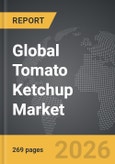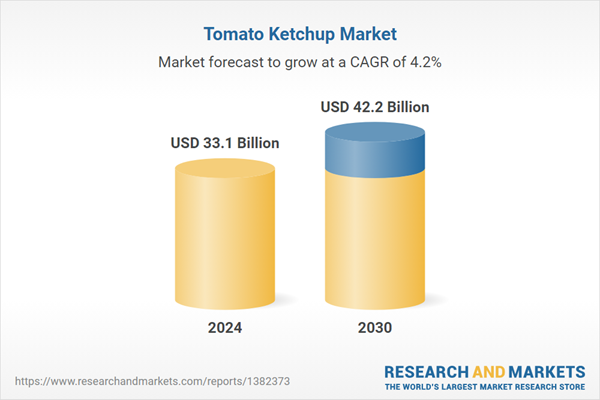Tomato Ketchup - Key Trends and Drivers
Tomato ketchup, a staple condiment in kitchens and restaurants worldwide, has a storied history and a profound cultural impact. Its origins can be traced back to the early 19th century, when it quickly gained popularity due to its unique sweet and tangy flavor profile that complements a wide array of dishes. The basic recipe for tomato ketchup includes tomatoes, vinegar, sugar, and a blend of spices and seasonings, all cooked down to create a smooth, thick consistency. This versatile condiment has become an integral part of Western cuisine, particularly as a complement to fast foods like burgers, fries, and hot dogs. Over the years, tomato ketchup has evolved, with manufacturers constantly innovating to meet changing consumer tastes and preferences. Today, ketchup varieties range from organic and reduced-sugar options to those free from artificial preservatives, reflecting a broader trend towards healthier and more natural food products.One significant trend in the tomato ketchup market is the increasing emphasis on health and wellness. As consumers become more health-conscious, there is a rising demand for ketchup that is made from organic ingredients, free from high-fructose corn syrup, and contains reduced sugar content. In response, manufacturers are developing new formulations that cater to these health trends while still preserving the beloved taste of traditional ketchup. This shift has also led to the rise of gourmet and artisanal ketchup varieties, which feature unique flavors and premium ingredients, appealing to food enthusiasts who seek a high-quality condiment experience. Additionally, the global movement towards clean labeling and transparency in food production is driving brands to highlight the purity and quality of their ingredients, further influencing consumer preferences. These trends are not just limited to the Western markets but are increasingly being seen in emerging markets where the middle class is growing and health awareness is on the rise.
The growth in the tomato ketchup market is driven by several factors. One major driver is the expanding fast-food industry, particularly in emerging markets where Western-style diets are becoming more popular. This shift increases the consumption of ketchup as a preferred condiment for various fast foods, such as burgers, fries, and sandwiches. Another significant factor is the rising trend of home cooking and dining, which has been accelerated by the COVID-19 pandemic. As people spend more time at home, there has been a noticeable increase in retail sales of ketchup, as consumers prepare more meals in their kitchens. Technological advancements in food processing and packaging have also played a crucial role in the market's growth. These advancements ensure longer shelf life, better preservation of flavor and nutrients, and enhanced safety of the product. Innovative packaging solutions, such as easy-squeeze bottles, single-serve packets, and eco-friendly packaging, have further enhanced consumer convenience and encouraged higher usage rates. Furthermore, strategic marketing efforts and product diversification by key players in the market are expanding the consumer base. This includes the introduction of ethnic flavors, catering to diverse culinary preferences, and fortified ketchup options that provide added vitamins and minerals, appealing to health-conscious consumers. Overall, the combination of these factors is driving the robust growth of the tomato ketchup market, making it a dynamic and evolving segment of the food industry.
Report Scope
The report analyzes the Tomato Ketchup market, presented in terms of market value. The analysis covers the key segments and geographic regions outlined below.- Segments: Flavor Type (Hot & Spicy, Sugar Free, Organic, Roasted Garlic, Other Flavor Types); Distribution Channel (Online Retailing, Super Market, Hyper Market, Convenient Stores, Other Distribution Channels).
- Geographic Regions/Countries: World; United States; Canada; Japan; China; Europe (France; Germany; Italy; United Kingdom; Spain; Russia; and Rest of Europe); Asia-Pacific (Australia; India; South Korea; and Rest of Asia-Pacific); Latin America (Argentina; Brazil; Mexico; and Rest of Latin America); Middle East (Iran; Israel; Saudi Arabia; United Arab Emirates; and Rest of Middle East); and Africa.
Key Insights:
- Market Growth: Understand the significant growth trajectory of the Hot & Spicy Ketchup segment, which is expected to reach US$15.4 Billion by 2030 with a CAGR of a 4.2%. The Sugar Free Ketchup segment is also set to grow at 4.3% CAGR over the analysis period.
- Regional Analysis: Gain insights into the U.S. market, valued at $8.9 Billion in 2024, and China, forecasted to grow at an impressive 6.9% CAGR to reach $8.8 Billion by 2030. Discover growth trends in other key regions, including Japan, Canada, Germany, and the Asia-Pacific.
Why You Should Buy This Report:
- Detailed Market Analysis: Access a thorough analysis of the Global Tomato Ketchup Market, covering all major geographic regions and market segments.
- Competitive Insights: Get an overview of the competitive landscape, including the market presence of major players across different geographies.
- Future Trends and Drivers: Understand the key trends and drivers shaping the future of the Global Tomato Ketchup Market.
- Actionable Insights: Benefit from actionable insights that can help you identify new revenue opportunities and make strategic business decisions.
Key Questions Answered:
- How is the Global Tomato Ketchup Market expected to evolve by 2030?
- What are the main drivers and restraints affecting the market?
- Which market segments will grow the most over the forecast period?
- How will market shares for different regions and segments change by 2030?
- Who are the leading players in the market, and what are their prospects?
Report Features:
- Comprehensive Market Data: Independent analysis of annual sales and market forecasts in US$ Million from 2024 to 2030.
- In-Depth Regional Analysis: Detailed insights into key markets, including the U.S., China, Japan, Canada, Europe, Asia-Pacific, Latin America, Middle East, and Africa.
- Company Profiles: Coverage of players such as DDM Novastar LLC, Ebso GmbH, epm Handels AG, ERSA GmbH, ITW EAE and more.
- Complimentary Updates: Receive free report updates for one year to keep you informed of the latest market developments.
Some of the 24 companies featured in this Tomato Ketchup market report include:
- Campbell Soup Company
- General Mills, Inc.
- Hindustan Unilever Ltd.
- Kikkoman Corporation
- Nestle SA
- Premier Foods PLC
- Tate & Lyle PLC
This edition integrates the latest global trade and economic shifts into comprehensive market analysis. Key updates include:
- Tariff and Trade Impact: Insights into global tariff negotiations across 180+ countries, with analysis of supply chain turbulence, sourcing disruptions, and geographic realignment. Special focus on 2025 as a pivotal year for trade tensions, including updated perspectives on the Trump-era tariffs.
- Adjusted Forecasts and Analytics: Revised global and regional market forecasts through 2030, incorporating tariff effects, economic uncertainty, and structural changes in globalization. Includes historical analysis from 2015 to 2023.
- Strategic Market Dynamics: Evaluation of revised market prospects, regional outlooks, and key economic indicators such as population and urbanization trends.
- Innovation & Technology Trends: Latest developments in product and process innovation, emerging technologies, and key industry drivers shaping the competitive landscape.
- Competitive Intelligence: Updated global market share estimates for 2025, competitive positioning of major players (Strong/Active/Niche/Trivial), and refined focus on leading global brands and core players.
- Expert Insight & Commentary: Strategic analysis from economists, trade experts, and domain specialists to contextualize market shifts and identify emerging opportunities.
Table of Contents
Companies Mentioned (Partial List)
A selection of companies mentioned in this report includes, but is not limited to:
- Campbell Soup Company
- General Mills, Inc.
- Hindustan Unilever Ltd.
- Kikkoman Corporation
- Nestle SA
- Premier Foods PLC
- Tate & Lyle PLC
Table Information
| Report Attribute | Details |
|---|---|
| No. of Pages | 269 |
| Published | February 2026 |
| Forecast Period | 2024 - 2030 |
| Estimated Market Value ( USD | $ 33.1 Billion |
| Forecasted Market Value ( USD | $ 42.2 Billion |
| Compound Annual Growth Rate | 4.2% |
| Regions Covered | Global |









